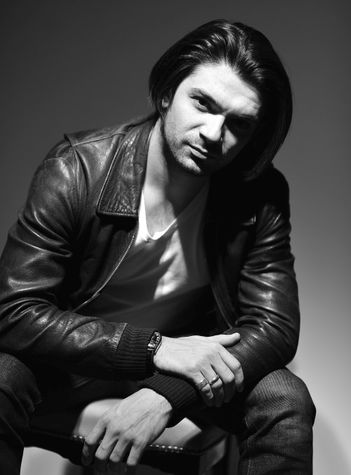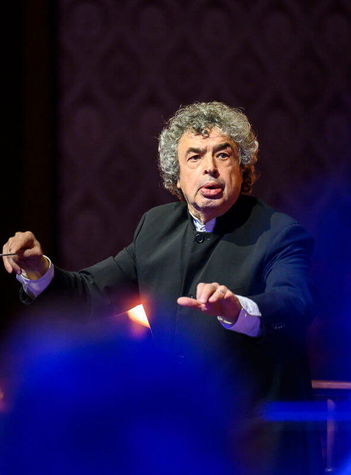Programme
Joseph Haydn
Cello Concerto No. 1 in C major, Hob.VIIb:1
Dmitri Shostakovich
Symphony No. 11 in G minor, Op. 103, “The Year 1905”
For the first of two concerts as orchestra-in-residence at the Philharmonie de Paris, the leading Czech orchestra has prepared Haydn’s Cello Concerto in C major played by Gautier Capuçon and Shostakovich’s great Symphony No. 11, which is about the 1905 revolution but symbolises any struggle between good and evil.
Joseph Haydn
Cello Concerto No. 1 in C major, Hob.VIIb:1
Dmitri Shostakovich
Symphony No. 11 in G minor, Op. 103, “The Year 1905”
Gautier Capuçon cello
Semyon Bychkov conductor
Czech Philharmonic

Gautier Capuçon cello

Gautier Capuçon is a true 21st century ambassador for the cello. Performing internationally with many of the world’s foremost conductors and instrumentalists, he is also founder and leader of the ‘Classe d’Excellence de Violoncelle’ at the Fondation Louis Vuitton in Paris. A multiple award winner, he is acclaimed for his expressive musicianship, exuberant virtuosity, and for the deep sonority of his 1701 Matteo Goffriller cello “L’Ambassadeur”.
Committed to exploring and expanding the cello repertoire, Capuçon performs an extensive array of works each season and regularly premieres new commissions. His current projects include performing the world premiere of Tabachnik’s cello concerto “Summer” and collaborations with Danny Elfman and Thierry Escaich.
In the 2019/2020 season Capuçon appears with, amongst others, the philharmonic orchestras of Los Angeles / Philippe Jordan, Czech Philharmonic / Semyon Bychkov, and Rotterdam / Valery Gergiev; the symphony orchestras of St. Louis / Stéphane Denève, Singapore / Vladimir Ashkenazy, and Bavarian Radio / Gianandrea Noseda; and hr-Sinfonieorchester / Alain Altinoglu. He tours Europe and the USA with Leipzig Gewandhausorchester / Andris Nelsons and San Francisco Symphony / Michael Tilson Thomas, and is Artist-in-Residence at LuganoMusica.
As a chamber musician, this season he performs on tour with Yuja Wang in venues such as Elbphilharmonie Hamburg, Vienna Konzerthaus, Barbican Centre London, and Philharmonie Paris, as well as with Renaud Capuçon, Frank Braley, Jérôme Ducros, and Leonidas Kavakos. Other regular recital partners include Nicholas Angelich, Martha Argerich, Daniel Barenboim, Lisa Batiashvili, Jean-Yves Thibaudet and the Artemis and Ébène quartets.
Recording exclusively for Erato (Warner Classics), Capuçon has won multiple awards and holds an extensive discography. His latest album – Chopin and Franck sonatas with Yuja Wang – was recorded live on tour last season. Earlier recordings include concertos by Shostakovich (Mariinsky Orchestra / Valery Gergiev) and Saint-Saëns (Orchestre Philharmonique de Radio France / Lionel Bringuier); the complete Beethoven Sonatas with Frank Braley; Schubert’s String Quintet with the Ébène Quartet; an album of encores recorded with Paris Chamber Orchestra / Douglas Boyd and Jérôme Ducros (entitled Intuition); and, most recently, an album of Schumann works, recorded live with Martha Argerich, Renaud Capuçon and the Chamber Orchestra of Europe / Bernard Haitink.
Capuçon has been featured on DVD in live performances with the Berliner Philharmoniker / Gustavo Dudamel (Haydn Cello Concerto No. 1) and with Lisa Batiashvili, Sächsische Staatskapelle Dresden and Christian Thielemann (Brahm’s Concerto for Violin and Cello). A household name in his native France, he also appears on screen and online in shows such as Prodiges, Now Hear This, and The Artist Academy, and is a guest presenter on Radio Classique in the show Les Carnets de Gautier Capuçon.
Born in Chambéry, Capuçon began playing the cello at the age of five. He studied at the Conservatoire National Supérieur in Paris with Philippe Muller and Annie Cochet-Zakine, and later with Heinrich Schiff in Vienna. Now, he performs with world leading orchestras, works with conductors such as Lionel Bringuier, Gustavo Dudamel, Charles Dutoit, Christoph Eschenbach, Andrés Orozco-Estrada, and Yannick Nézet-Séguin; and collaborates with contemporary composers including Lera Auerbach, Karol Beffa, Esteban Benzecry, Nicola Campogrande, Qigang Chen, Bryce Dessner, Jérôme Ducros, Henry Dutilleux, Thierry Escaich, Philippe Manoury, Bruno Mantovani, Krzysztof Penderecki, Wolfgang Rihm, and Jörg Widmann.
For further information please visit the homepage https://www.gautiercapucon.com/
Semyon Bychkov conductor

In addition to conducting at Prague’s Rudolfinum, Semyon Bychkov and the Czech Philharmonic in the 2023/2024 season, took the all Dvořák programmes to Korea and across Japan with three concerts at Tokyo’s famed Suntory Hall. In spring, an extensive European tour took the programmes to Spain, Austria, Germany, Belgium, and France and, at the end of year 2024, the Year of Czech Music culminated with three concerts at Carnegie Hall in New York.
Among the significant joint achievements of Semyon Bychkov and the Czech Philharmonic is the release of a 7-CD box set devoted to Tchaikovsky’s symphonic repertoire and a series of international residencies. In 2024, Semjon Byčkov with the Czech Philharmonic concentrated on recording Czech music – a CD was released with Bedřich Smetanaʼs My Homeland and Antonín Dvořákʼs last three symphonies and ouvertures.
Bychkovʼs repertoire spans four centuries. His highly anticipated performances are a unique combination of innate musicality and rigorous Russian pedagogy. In addition to guest engagements with the world’s major orchestras and opera houses, Bychkov holds honorary titles with the BBC Symphony Orchestra – with whom he appears annually at the BBC Proms – and the Royal Academy of Music, who awarded him an Honorary Doctorate in July 2022. Bychkov was named “Conductor of the Year” by the International Opera Awards in 2015 and, by Musical America in 2022.
Bychkov began recording in 1986 and released discs with the Berlin Philharmonic, Bavarian Radio, Royal Concertgebouw, Philharmonia Orchestra and London Philharmonic for Philips. Subsequently a series of benchmark recordings with WDR Symphony Orchestra Cologne featured Brahms, Mahler, Rachmaninov, Shostakovich, Strauss, Verdi, Glanert and Höller. Bychkov’s 1993 recording of Tchaikovsky’s Eugene Onegin with the Orchestre de Paris continues to win awards, most recently the Gramophone Collection 2021; Wagner’s Lohengrin was BBC Music Magazine’s Record of the Year (2010); and Schmidt’s Symphony No. 2 with the Vienna Philharmonic was BBC Music Magazine’s Record of the Month (2018).
Semyon Bychkov has one foot firmly in the culture of the East and the other in the West. Born in St Petersburg in 1952, he studied at the Leningrad Conservatory with the legendary Ilya Musin. Denied his prize of conducting the Leningrad Philharmonic, Bychkov emigrated to the United States in 1975 and, has lived in Europe since the mid-1980’s. In 1989, the same year he was named Music Director of the Orchestre de Paris, Bychkov returned to the former Soviet Union as the St Petersburg Philharmonic’s Principal Guest Conductor. He was appointed Chief Conductor of the WDR Symphony Orchestra (1997) and Chief Conductor of Dresden Semperoper (1998).
Joseph Haydn
Cello Concerto No. 1 in C major, Hob.VIIb:1
Dmitri Shostakovich
Symphony No. 11 in G minor, Op. 103, “The Year 1905”
In September 1956 Dmitri Shostakovich celebrated his 50th birthday. He was considered the greatest symphonist of his time and was beginning to take stock. “I think that many things repeat themselves in Russian history. Of course the same event can’t repeat itself exactly, there must be differences, but many things are repeated nevertheless. People think and act similarly in many things… I wanted to show this recurrence in the Eleventh Symphony. I wrote it in 1957 and it deals with contemporary themes even though it’s called “1905”. It is about the people who have stopped believing because the cup of evil has run over. That is how the impressions of my childhood and my adult life come together.” Shostakovich himself was not witness of the bloody suppression of the 1905 St Petersburg uprising, but his family discussed this event all the time. He personally experienced the October Revolution of 1917, whose 40th anniversary had just been celebrated in 1957, and throughout his life he also felt its consequences: bullying and injustice on the one hand, and bombastic tributes and platitudes on the other. He was also constantly confronted with the regime that the 1917 Revolution had established, by which he was attacked and dragged under.
Symphony No. 11 in G minor, Op. 103, was written in 1957 during Shostakovich’s summer stay in Komarovo near what was then Leningrad. Two themes run through the entire work – the theme introduced by the string section at the beginning of the symphony and, in contrast, the ominous timpani strokes. These leitmotifs, which constantly undergo a transformation, symbolize the historical repetition of events mentioned by the composer over the course of four movements played without a pause. Other elements include quotations from 19th-century political songs – songs of the revolutionary year 1905, as well as from Shostakovich’s other compositions. The first movement, introduced by the two contrasting themes of strings and timpani, features a melody of the song “Slushay!” (Listen!) from 1864, followed by “Arrestant” (The Prisoner) from 1857. In the second movement Shostakovich has incorporated melodies from his Ten Choruses on Texts by Revolutionary Poets from 1951; they are gradually escalating into sharp marching rhythms. The uprising breaks out, is defeated, and a deathlike silence reigns outside the Winter Palace. The third movement is a symbolic remembrance of the fallen victims, featuring the well-known funeral march of the Russian revolutionaries “You Fell Victim to a Fateful Struggle” and quotes from other revolutionary songs such as “Baikal”, “'Boldly on We March, Comrades!” and “Welcome, Free Speech”. A new revolution sprouts out of the grief for the dead, and it spreads with the other songs included in the fourth movement. The coda, again with the motif of Palace Square, anticipates a new bloodshed and warns against it.
The symphony premiered on 30 October 1957 in Moscow under Natan Rakhlin. Understandably, it was met with mixed reactions. Party leaders ranked it among the exemplary works of Socialist Realism and honored the composer with the Lenin Prize, but in circles that had already begun to shake off the chains of demagoguery it was regarded as a libation and, as far as its artistic value was concerned, as illustrative film music. After another 50 years, many details of the composer’s complicated life, sandwiched between the millstones of constant party criticism and his own convictions as an artist and human being, are now known. The symphony is now seen in the spirit which Shostakovich himself suggested – as a manifestation of the strangely turning wheel of fate, which returns many moments of development to the starting point from which humanity sets out each time to find anew the justification for its existence.